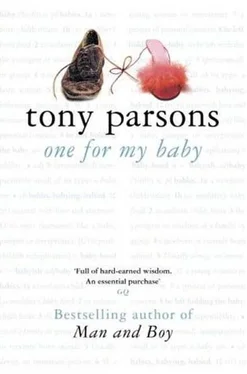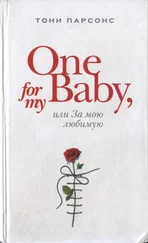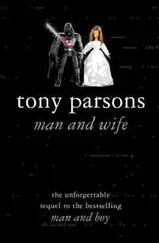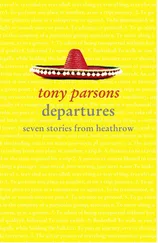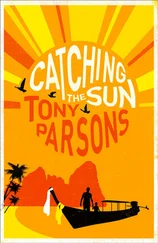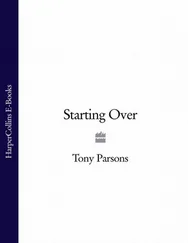Yet when I pick Olga up at the clinic, I find that I like her more than I ever did.
She looks so young and so pale and so drained, as though she has been through something that will stay with her for the rest of her life, something that will change the way she looks at the world, and I don’t want to split up with her. I really want to make a go of it. To try. This feeling lasts until the moment I put my arm around her and she gives me a flat, dead look.
“I’m okay.”
“Come back to my place.”
“What?”
“Don’t go back to your flat. Come back to mine. You can have your own room. I’ll sleep on the sofa. Just until you-you know.” What are the words? “Feel better.”
I can tell she doesn’t like the idea much. But the idea of returning to the damp south London apartment she shares with three other Russians appeals to her even less. So we get a taxi and-silently, not touching me, huddled inside her cheap black coat-she comes back to my apartment, where she moves very slowly, as if in great pain or afraid of breaking something, and she spends a long time in the bathroom before going to bed.
I look in on her after a while and see her sleeping, her face almost as pale as the pillow she rests on. Later she gets up and asks me if she can make a phone call, and I say of course you can, you don’t even have to ask me, and she spends a long time talking in Russian to someone I guess is her boyfriend, the glottal stops of the language made even harsher by her crying.
I have no idea how much she tells him. But she politely thanks me for the use of the phone, as if we have just been introduced and I have just passed the salt, and then she shuffles off to bed, soon falling asleep as the winter day quickly dies and darkness creeps into my flat. I don’t turn the lights on.
What makes me laugh-no, what makes me sit with my face in my hands in the living room, sit alone in the gathering darkness with Olga sleeping in my bed, sometimes muttering in her sleep, sometimes crying out what could be a name-is that Rose and I wanted a baby so much.
It would have been the best thing in the world. For us.
My wife and I. We tried. We had been trying since our wedding day. She even had all the equipment. By her bedside there was this little white and pink box the size of a glasses case with a thermometer to take her temperature when she woke up. She also had this stick thing that she took into the bathroom every morning to tell her when her ovulation was on the way and we should think about getting started. Pencil the date into our diaries.
Trying tonight.
Oh, she had all the kit.
After almost a year of disappointment, we were about to take the tests. Me making love to a little plastic jar, Rose having her plumbing checked out-whatever it is you have to do. We tried to make a joke of it, the way we tried to make a joke of everything.
“And how would you like your eggs, madam?”
“Fertilized!”
We ran out of time. It never happened for us. Our baby never came. And then Rose was gone.
She really wanted a child with me. You might find that hard to believe. It’s true. She thought I would be a good father. That’s not a joke. “You’ll be such a wonderful dad, Alfie,” she said to me. Rose really wanted to have a baby with me, although of course that was back in the years when I was really alive and, I realize, a far better man than I am today.
The next morning I leave Olga asleep and go to my local book shop to buy a gift for Plum.
“I’m looking for a book,” I tell the young man behind the counter. “It’s called, ah…”
“Title? Author?”
“It’s…ah…Smell the Fear…something-something.”
“Smell the Fear, He-bitch? Yeah, it’s the new one by The Slab. The wrestling person. You’ll find it by the door.”
Right by the double doors at the front of the store, I find a huge display of Smell the Fear, He-bitch. I pick up a copy and look at a massive, seminaked bald man grinding his teeth on the cover. He looks like a bodybuilder modeling underpants.
I flip through the picture-packed pages. Most of the images are of The Slab beating up other big men in skin-tight Lycra-or at least pretending to. But there’s one section toward the back of the book where The Slab is seen posing with small children of every race and color. In the large print surrounding the photos, The Slab speaks of his philosophy. The importance of charity work, the need to combat racism, the moral imperative of being good to each other when the day’s bloody mayhem is done.
He calls it doing the human thing.
And I find that, no matter how hard I try, I just can’t raise a sneer today.
“The Slab says do the human thing-or I will whip your candy ass all the way to the Tree of Woe.”
Do the human thing?
It feels like the best advice I have heard for years.
When I get back home I discover that Olga has gone. No note, no good-bye, just a few stray red hairs in the bathroom sink. I decide we can’t end it this way and call her flat. I am anxious to do the human thing. One of her roommates answers and goes to get her. Then she comes back to tell me that Olga doesn’t want to talk to me.
Sometimes you can leave it too late to do the human thing.
And I think about Chinese New Year, Spring Festival, and how much I love what I think of as the symmetry of the Changs.
George and Joyce, Harold and Doris, little Diana and William-there is a balance and harmony about their family that makes me ache with envy.
My own family feels like all broken bits and jagged edges and half-forgotten leftovers compared to the Changs.
My nan with her husband long dead, my mum with her husband run away, and me and Olga, who must have looked like something approaching a normal couple on Chinese New Year, but who, out of all my shattered family tree, have turned out to be the most defective branch of all.
But I had a family once, and we had a plan. We were going to have children and everything.
That’s what we wanted, Rose and I, that was what we wished hard for, that was our plan. Children and everything.
I KNOW THAT HIROKO WILL TALK TO ME. I know that Hiroko still gets the soft look in her eyes when she sees me. Hiroko will do the human thing. Especially if she can sneak me past her landlady. Then we will do the human thing from midnight to dawn. Well, at least until about five past twelve.
I meet her at the little fake French café where we used to have our full English breakfasts and cappuccino-flavored kisses. I wonder why I let that time end and feel a huge wave of relief when she walks into the place, her shiny hair swinging just as it always did, her eyes still shy and gleaming behind her black-framed glasses. She is such a wonderful young woman. Why did I ever let her get away? Was it something to do with her liking me more than I like myself?
It’s early evening and the place is full of couples. We have come to the right place. I put my arm around her and try to place my mouth on top of her mouth.
“No,” she says, laughing and turning her face away.
I find myself pecking the side of her head, tasting a cocktail of hair, ear and spectacles.
“No?”
She holds my hands by my side. It seems partly an act of affection and partly a self-defence technique.
“I still care about you,” she says.
“That’s great. Because I still care about you too.”
“But differently.”
“That doesn’t sound so great.”
“You said I would meet someone else.”
“Yes, but there’s no need to rush things.”
“I’ve been spending a lot of time with Gen.”
“Gen?” I see the quiet, funky Japanese boy in the front row of my Advanced Beginners, peering up at me through a haystack of dyed brown hair. “But Gen’s just a kid.”
Читать дальше
